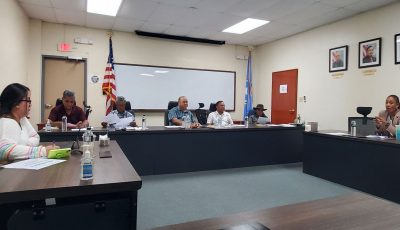IPI preliminary injunction denied
IPI appeals to Ninth Circuit
U.S. District Court for the NMI Chief Judge Ramona V. Manglona has denied the petition of the Imperial Pacific International (CNMI) LLC and its two subsidiaries for a preliminary injunction to prohibit the Commonwealth Casino Commission from releasing IPI’s audited financial statements.
Soon after Manglona issued the decision, Viola Alepuyo, IPI legal counsel and special projects senior vice president, said they are reviewing the court order and discussing with IPI what options it would prefer to pursue.
Later yesterday afternoon, IPI, through counsel Kelley Butcher, informed the District Court that IPI is appealing Manglona’s decision to the U.S. Court of Appeals for the Ninth Circuit.
In a 25-page decision on Tuesday, Manglona ruled that IPI and its subsidiaries—Grand Marianas (CNMI) LLC and Imperial Pacific Properties LLC—have not met their burden for a preliminary injunction.
Manglona, however, declined to address at this time the motion to return IPI’s lawsuit against CCC to the Superior Court, which was filed by IPI and its subsidiaries, as the issues of abstention and supplemental jurisdiction raised in the motion will be further briefed and argued.
“They have not shown that irreparable harm is likely without an injunction, that the balance of equities tips in their favor, or that an injunction is in the public interest,” the judge said.
Manglona said IPI’s subsidiaries have demonstrated that there are serious questions going to the merits, but without “a hardship balance that tips sharply toward [IPI],” a preliminary injunction for their benefit is not warranted.
Manglona said IPI has not even made a threshold showing that serious questions exist, let alone that they are likely to succeed on the merits.
The judge said this case requires her to reconcile laws that protect two important public interests: the public’s interest in an open government that transacts business in the light of day, and the interest of individuals and companies in preventing the unnecessary disclosure of their private, confidential information that the CNMI government comes to possess.
IPI and its subsidiaries have asked the federal court to prevent the disclosure of unredacted financial statements because, in their view, those statements contain confidential information protected from disclosure by provisions in the CNMI tax code and the Open Government Act, and by guarantees of privacy in the U.S. and Commonwealth constitutions.
In order to obtain such protection, IPI filed a petition for preliminary injunction prohibiting CCC from releasing the unredacted financial statements while the case is pending.
According to court records, the dispute arises from the Open Government Act request filed by Rep. Edwin K. Propst (Ind-Saipan) with CCC on June 13, 2019. He asked for information relating to the 2017 and 2018 audit reports prepared by Ernst & Young for IPI/Best Sunshine; all business gross revenue tax payments made by IPI/Best Sunshine to date, with amounts and date; and all corporate income taxes paid by IPI/Best Sunshine.
CCC notified IPI of the request and asked IPI to respond. IPI objected to the release of its tax information.
Assistant attorney general Michael Ernest later told IPI that CCC intended to release the information on June 24, 2019 over its objections. That same day, June 24, IPI filed a petition for temporary restraining order and preliminary injunction, as well as a petition for injunctive relief and complaint for declaratory relief at the Superior Court, asking that CCC and its executive director, Edward Deleon Guerrero, be stopped from releasing IPI’s tax information.
All parties agreed to the intervention of IPI’s subsidiaries, Grand Marianas (CNMI) LLC and Imperial Pacific Properties LLC, but limited the scope of their argument to the disclosure of their own information only.
Superior Court Associate Judge Kenneth L. Govendo initially granted the TRO last June 24, then extended it to July 25. Govendo also held several days of hearings on the petition.
Last July 23, CCC and Deleon Guerrero moved the case to the federal court. Manglona extended the TRO to Aug. 2 and set a hearing on the preliminary injunction.
The parties agreed that the scope of a preliminary injunction should be limited to the release of unredacted consolidated financial statements from 2015, 2015/2016, and 2016/2017.
IPI’s subsidiaries argue that protection should apply to the 2017/18 financial statement as well.
The 2017/2018 financial statement has already been released under unclear circumstances.
Manglona had a hearing on the petition for preliminary injunction last July 30 and Aug. 1, then extended the TRO to today, Thursday, at 11:59pm.
In her order denying the petition, Manglona said a preliminary injunction can be granted only if the party requesting it can establish that it is likely to win the case on the merits, it will suffer irreparable harm if the court does not grant the injunction, the balance of equities between the parties tips in its favor, and an injunction is in the public interest.
The judge said that IPI and its subsidiaries have not demonstrated that a preliminary injunction is warranted under this test.
IPI and its subsidiaries argue that the disclosure of their information is prohibited by the CNMI tax code and the Open Government Act.
CCC contends that the disclosure is required under the Gaming Act at 4 CMC Section 2314.
Manglona said the purpose of Section 2314 is to strip the casino licensees’ audited annual financial statements of confidentiality and guarantee that they be available for public inspection.
Conversely, Manglona said, the sections from the tax code and OGA are aimed at protecting tax information from wrongful disclosure and public inspection.
“For these reasons, the court finds that IPI is unlikely to succeed in its argument that the CNMI tax code and OGA provisions control,” the judge said.
IPI asserts that section 2314 is ambiguous in that it does not explicitly authorize the release of tax returns and return information.
CCC counters that the statute is clear and unambiguous; it mandates that all audited annual financial statements are not confidential and are subject to public inspection.
Manglona ruled that IPI is not likely to succeed on the merits of its argument that section 2314 is ambiguous. “The statute clearly states that all annual audited financial statements shall be made available for public inspection,” she said.
IPI’s subsidiaries assert that the public disclosure provisions of section 2314 apply to casino licensees and any information CCC collects about other companies is confidential under the general confidentiality provision.
The subsidiaries only seek to redact the supplemental information that was not required under the General Accepted Auditing Standards and as such did not need to be included in IPI’s financial statements. The subsidiaries also argue that their information is protected under the OGA.
At this stage of the proceedings, Manglona said, the court does not have enough information about the subsidiaries and their role in possibly assisting IPI with its investments to definitively conclude that their financial information is not subject to section 2314 disclosure.
“Therefore, the court agrees that there is enough ambiguity in the statute regarding its application to parties other than the casino licensee to raise a serious question on the merits,” Manglona said.
The subsidiaries argue that the protections of the OGA should apply to their information.
Manglona said section 2314 specifically applies to IPI as the casino licensee, but it does not specifically address confidentiality for non-gaming subsidiaries like IPI’s subsidiaries.
This, the judge pointed out, also raises a serious question as to which statute should apply to the subsidiaries’ information in this case.
Therefore, Manglona said, she finds that the subsidiaries have raised serious questions going to the merits of their claims that cannot be resolved at this time.
On IPI’s CNMI constitutional claim, Manglona said IPI’s argument that there is no rational basis for treating corporate and individual taxpayers differently is unlikely to succeed on the merits.
As the CCC argued, Manglona said, there are many plausible reasons for subjecting the casino licensee to greater regulation than an individual or even another type of business, including its monopoly status and general concerns about financial crimes and gambling.
“Therefore, the court finds that IPI is unlikely to be successful on the merits of this claim,” she said.
On the federal constitutional claim, Manglona said although the jurisprudence governing federal constitutional rights of corporations is not settled, she finds little likelihood that IPI would succeed on this claim.
Manglona said the constitutional corporate right to privacy it rests on has not been recognized by the Ninth Circuit or the U.S. Supreme Court.
Manglona said gambling is a highly regulated industry, and the CNMI Legislature was clear and unambiguous that the licensee would not have an expectation of privacy in the seven categories of information exempted in the statute.
On the issue of irreparable harm, the judge said she acknowledges that, outside of certain regulated industries, audited financial statements are confidential documents, but neither IPI nor the subsidiaries have established particularized, non-speculative harm likely to arise from its disclosure that is sufficient to demonstrate that irreparable harm is likely without a preliminary injunction.
With respect to the issue of balance of equities, IPI and its subsidiaries asserted harm in fundraising and investor-relations difficulties.
CCC argues that it is harmed by being prevented from complying with the law until this lawsuit is resolved.
CCC concedes that it is unlikely that its director or any CCC employee would be prosecuted for not releasing the information under court order.
Manglona found that the balance of equities does not weigh heavily on either side.
However, the judge noted, the burden is on IPI and its subsidiaries to prove the scales tip in their favor.
“The only interest they have asserted is vague and speculative and not enough to tip the balance of equities in their favor,” she said.
On public interest, Manglona said there are two important public interest concerns at play in this case: governmental transparency and governmental respect for privacy rights.
Manglona said the public interest in transparency is served by allowing CCC to release the unredacted financial statements.
She said the risk of undermining public confidence in privacy rights is diminished by the fact that IPI is in a unique position: as the exclusive casino licensee, it is subject to regulations that govern no individual or other business in the CNMI.
Manglona said IPI’s subsidiaries may have concerns about their corporate structure and how their parent company incorporates. Those concerns are for their parent company, IPI, to address, said the judge in concluding that the public interest weighs in favor of denying the preliminary injunction.



























